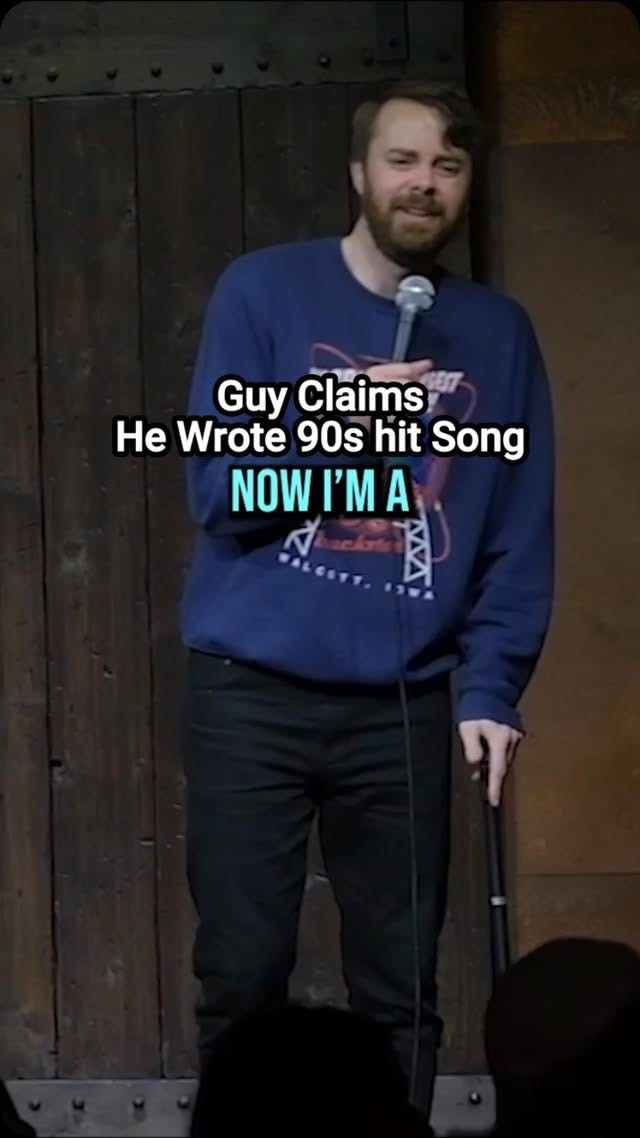The internet is a fascinating place, especially when it comes to comedy. Recently, my Instagram feed served up a video clip of stand-up comedian Geoffrey Asmus engaging in some crowd work. Now, crowd work can be hit or miss, often landing somewhere between awkward and mildly amusing. But this particular clip caught my attention because it veered into the realm of rock and roll mythology, specifically concerning the band Green Day and a supposed ghostwriter of Green Day Green Day Song hits.
In the video, Asmus chats with an audience member named Tom, who claims to be a retired musician and songwriter. When pressed about his songwriting credits, Tom drops a bombshell: he alleges to have penned Green Day’s iconic tracks “Basket Case” and “Good Riddance (Time of Your Life).”
Image: Instagram embed of Geoffrey Asmus’s post featuring the comedian interacting with “Tom” about Green Day songs.
As a self-proclaimed Green Day superfan – and someone who may or may not have written a book about them – this claim immediately raised red flags. Green Day, known for their DIY punk ethos and Billie Joe Armstrong’s distinctive songwriting, using a ghostwriter, especially during their breakout Dookie era? It seemed highly improbable. Was this just a tall tale spun for laughs, a bid for internet fame, or could there be a sliver of truth to this audacious claim about writing green day green day song classics?
When Asmus playfully calls Tom’s bluff and pretends to look up the songwriting credits online, Tom quickly backpedals, invoking the classic “shadow writer’s contract” defense. This only deepened the suspicion. While the comedy club audience might have been entertained, my inner Green Day enthusiast demanded answers. Let’s dive into this supposed conspiracy and see if Tom’s story holds any water, especially when talking about the creation of green day green day song anthems.
To unravel this mystery, we need to rewind to the early 1990s, specifically late 1992 and early 1993. This period is crucial because, according to Billie Joe Armstrong himself, it’s when the demos for Dookie, the album that catapulted Green Day to superstardom and featured many beloved green day green day song hits, were recorded. At this time, Green Day was still an independent band signed to Lookout Records, a local label. These demo versions, including early takes of “She” and “Longview,” were instrumental in attracting the attention of major record labels. Rob Cavallo, then an A&R rep, signed them to Warner Brothers in the summer of 1993, leading to the release of Dookie in February 1994.
Image: Album cover for Green Day’s “Dookie” album, a pivotal release featuring iconic Green Day songs.
The idea that Green Day would have employed a co-writer before securing a major label deal seems highly unlikely. Where would a young, independent band, reportedly living in a Berkeley basement apartment, find the resources to hire a songwriter? Even after signing with Warner Brothers, producer Rob Cavallo has described Green Day as not being a top priority for the label initially. Their contract, around $200,000, was considered modest compared to other artists on the roster. This financial context makes the “shadow writer” claim for green day green day song creation even more dubious.
However, to give “Tom” a tiny sliver of benefit of the doubt, there’s a known detail about the early development of “Basket Case.” The earliest four-track demo version of this now-classic green day green day song had completely different lyrics. In his Song Exploder episode, Armstrong confessed that he initially wrote less-than-stellar lyrics while under the influence of crystal meth. Upon sobering up, he realized the original lyrics were subpar and almost abandoned the song. “I kind of let the song go because I felt so gross about it,” he admitted, “[But] I was like, maybe it’ll come back.” So, if a songwriter were to have been involved – and again, skepticism remains high – it theoretically could have been during this period, assisting with rewriting the lyrics to match Armstrong’s melody for what would become a defining green day green day song.
But Tom doesn’t stop at “Basket Case.” He escalates his claim by adding “Good Riddance (Time of Your Life)” to his list of supposed songwriting credits. Why not, indeed? Once you’ve claimed authorship of one Grammy-nominated green day green day song, might as well go for two. Perhaps he also secretly penned “Smells Like Teen Spirit” and “Jeremy” in his spare time? Adding another layer of questionable detail, Tom even asserts that he played “Good Riddance” at his high school graduation in 1984, a full 13 years before Green Day officially released the song. His college buddies, naturally, corroborated this unbelievable story, as college buddies are honor-bound to do, especially when it comes to embellishing tales around green day green day song origins.
One might initially think, “Okay, ‘Good Riddance’ came out in 1997, during Green Day’s major-label era. Maybe they could have afforded songwriters by then?” But alas, this line of reasoning is also flawed. Any true Green Day aficionado knows that “Good Riddance” was actually written during the Dookie sessions. The band opted to hold onto it, releasing it later. This timeline further undermines Tom’s narrative about contributing to this particular green day green day song. It’s like claiming you helped write a song for a band when it was already essentially completed years prior! Did this supposed songwriter also not know Green Day used to be called Sweet Children?
Image: A reaction image depicting skepticism and disbelief, mirroring the likely reaction to Tom’s outlandish claims about Green Day songwriting.
Let’s humor Tom for a moment and entertain his version of events. He somehow connects with a struggling punk band around 1993, assists one of the most gifted songwriters of a generation in crafting two mega-hits, and then remains silent for three decades. He only reveals this secret when a nightclub comedian casually asks him about his profession, spilling the beans about his involvement in green day green day song creation to a room full of strangers. Sure, Tom. That sounds… plausible?
But there’s a snag. Asmus, in the video, expresses surprise that Tom is “already retired.” The word “already” suggests Tom appears younger than someone who would typically be retired. If Tom graduated high school in 1984, as he claims, he’d likely be born around 1966, making him about 58 years old today. While retirement at 58 might seem early in today’s economic climate, it’s not unheard of. Is it that shocking to hear a 58-year-old man say he’s retired? Or is Tom perhaps younger than he’s letting on, adding another layer of fabrication to his green day green day song authorship story?
This is where the whole story crumbles. The timeline inconsistencies, the financial realities of early Green Day, and the age-related question marks all point to one conclusion: bullshit. The internet commenters on Asmus’s video reached this verdict swiftly, with humorous skepticism. “I wrote the Gettysburg address,” one quipped. “I worked on Symphony No.5 with ‘Toven on a crazy weekend you don’t see me bragging about it,” another joked.
So, believe Tom’s tale of secretly writing iconic green day green day song hits if you wish. But the evidence strongly suggests it’s a fun, albeit improbable, story. Regardless of your stance, one thing is undeniable: comedian Stavros Halkias would have dismantled Tom’s story in seconds. No disrespect to Asmus, but he was far too lenient. Had Tom tried this rock and roll fable on Stavvy, who once famously got a musician to confess to having a trust fund with just three questions, the truth would have emerged faster than you can say “green day green day song“!
Image: Instagram embed of Stavros Halkias’s post, suggesting his comedic style is more incisive and less forgiving than Geoffrey Asmus’s.
Perhaps the real mystery isn’t who wrote those green day green day song masterpieces, but why Tom felt the need to invent such a far-fetched story in the first place. Maybe it’s just the allure of the spotlight, even a fleeting one in a comedy club. Or maybe, just maybe, there’s a sliver of a shadow of a doubt… Nah, probably not. But it’s a fun story to ponder, especially for fans of green day green day song history.




